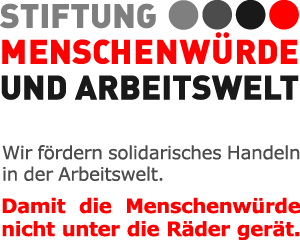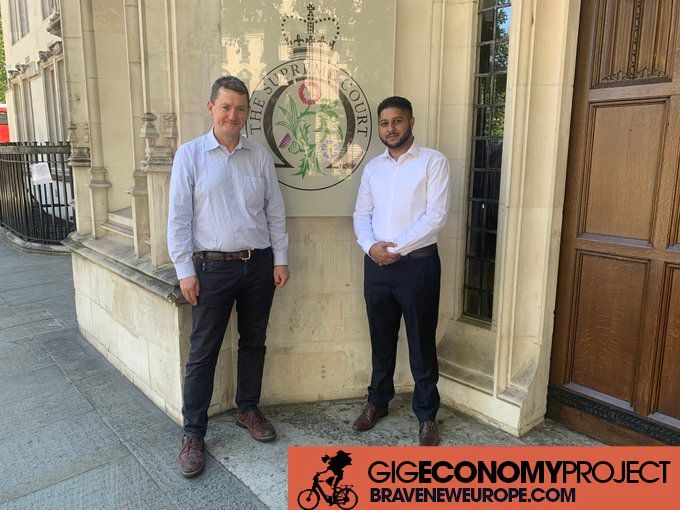The legal verdicts against Uber and for workers are mounting up across Europe. Its business model may not be able to survive this.
Ben Wray is a freelance journalist leading BRAVE NEW EUROPE’S Gig Economy Project.
This series of articles concerning the Gig Economy in the EU was made possible thanks to the generous support of the Foundation Menschenwürde und Arbeitswelt


Yaseen Aslam and James Farrar at the UK Supreme Court
In a court verdict expected to have major implications for the gig economy, the UK Supreme Court has found that Uber drivers are workers for the company from the moment they log-in to when they log-out.
The verdict will ensure Uber drivers in the UK are now entitled to earn at least minimum wage, holiday pay, freedom from discrimination and whistleblower protection. The ‘worker’ status is not the same as full employment status in the UK, meaning that – for example – Uber drivers still do not have the legal right to challenge unfair dismissal.
The Court was asked to decide on two things: whether Uber drivers were workers in law, and if so what is their working time.
On the first judgement, Lord Legatt emphasised five aspects which led to the conclusion that Uber drivers are not independent contractors but workers: 1) That Uber sets the fares. 2) Uber sets the contract terms for the performance of the service. 3) Uber constrains the ability of drivers to choose when to accept fares. 4) Uber exercises significant control over service performance, including through the ratings system. 5) Uber restricts communications between passenger and driver and takes active steps to prevent a relationship being established which could lead to commercial activity outside of Uber’s control.
“Taking these factors together, the transportation service performed by drivers and offered to passengers through the Uber app is very tightly defined and controlled by Uber. Drivers are in a position of subordination and dependency in relation to Uber such that they have little or no ability to improve their economic position through professional or entrepreneurial skill. In practice the only way in which they can increase their earnings is by working longer hours while constantly meeting Uber’s measures of performance,” the summary of the judgement reads.
On the second judgement, Legatt finds that “time spent by the claimants working for Uber was not limited (as Uber argued) to periods when they were actually driving passengers to their destinations, but included any period when the driver was logged into the Uber app within the territory in which the driver was licensed to operate and was ready and willing to accept trips.”
This second judgement is highly significant, as Uber drivers can spend a significant amount of their working hours waiting to get jobs, so for the first time they should now be compensated for that waiting time by Uber. This could put pressure on the company to stop the practise of over-supply of drivers on the app, which pushes down the income earned by each driver as less work is available.
The Supreme court verdict, delivered on the morning of Friday 19 February, is the final one, and brings an end to a six year dispute brought forward by James Farrar and Yaseen Aslam, former Uber drivers and members of the App Drivers & Couriers Union (ADCU), which has been fought in one court battle after another.
The case started in 2015 after Farrar was assaulted on the job. Uber refused to co-operate with the police in identifying the passenger.
Commenting on the verdict, Aslam, president of the ADCU, told the BBC: “I think it’s a massive achievement in a way that we were able to stand up against a giant.
“We didn’t give up and we were consistent – no matter what we went through emotionally or physically or financially, we stood our ground.”
Commenting on the second judgement on working time, James Farrar, general secretary of ADCU, said: ”This is a win-win-win for drivers, passengers and cities. It means Uber now has the correct economic incentives not to oversupply the market with too many vehicles and too many drivers. The upshot of that oversupply has been poverty, pollution and congestion.”
Farrar added that in the context of the pandemic, changes need to be brought in urgently.
“We’re seeing many of our members earning £30 gross a day right now,” he said. “If we had these rights today, those drivers could at least earn a minimum wage to live on.”
The verdict is set to have major implications for the business model of Uber, which is based on outsourcing costs as far as possible to the worker themselves. It could also set a precedent for other UK gig economy workers such as riders for Deliveroo who operate under a very similar work arrangement.
Dr Kelle Howson, researcher, Fairwork Foundation, Oxford Internet Institute said, there can be no guarantees that Uber will obey with the ruling. “We have seen Uber continuously introduce new strategies to circumvent labour laws in many countries, and it is crucial for regulators to anticipate potential responses which could further marginalise drivers, such as contracting with exploitative intermediaries, and laying off workers.”
Commenting, Dr Jeremias Adams-Prassl, professor of Law at Oxford University, said: “The UK Supreme Court joins a growing number of Supreme Courts across Europe (including France and Spain) in looking through the myths of entrepreneurship and innovation”.
The UK Supreme Court’s verdict comes less than a week before the EU Commission is set to begin work on a Directive to regulate platform work (24 February). Uber have sought to influence that agenda, already publishing a white paper calling for the company to be exempt from labour laws.
The FairWork initiative have published a response to Uber’s paper, arguing that the “benefits proposed in Uber’s white paper, like those provided under Proposition 22 [in California], represent weakened versions of those afforded to employees. We need to strengthen and expand existing labour protections in order to improve conditions, not create additional exclusions and exemptions that leave millions behind.”
BRAVE NEW EUROPE is an educational platform for economics, politics, and climate change that brings authors at the cutting edge of progressive thought together with activists and others with articles like this. If you would like to support our work and want to see more writing free of state or corporate media bias and free of charge, please donate here.


1 Trackback / Pingback